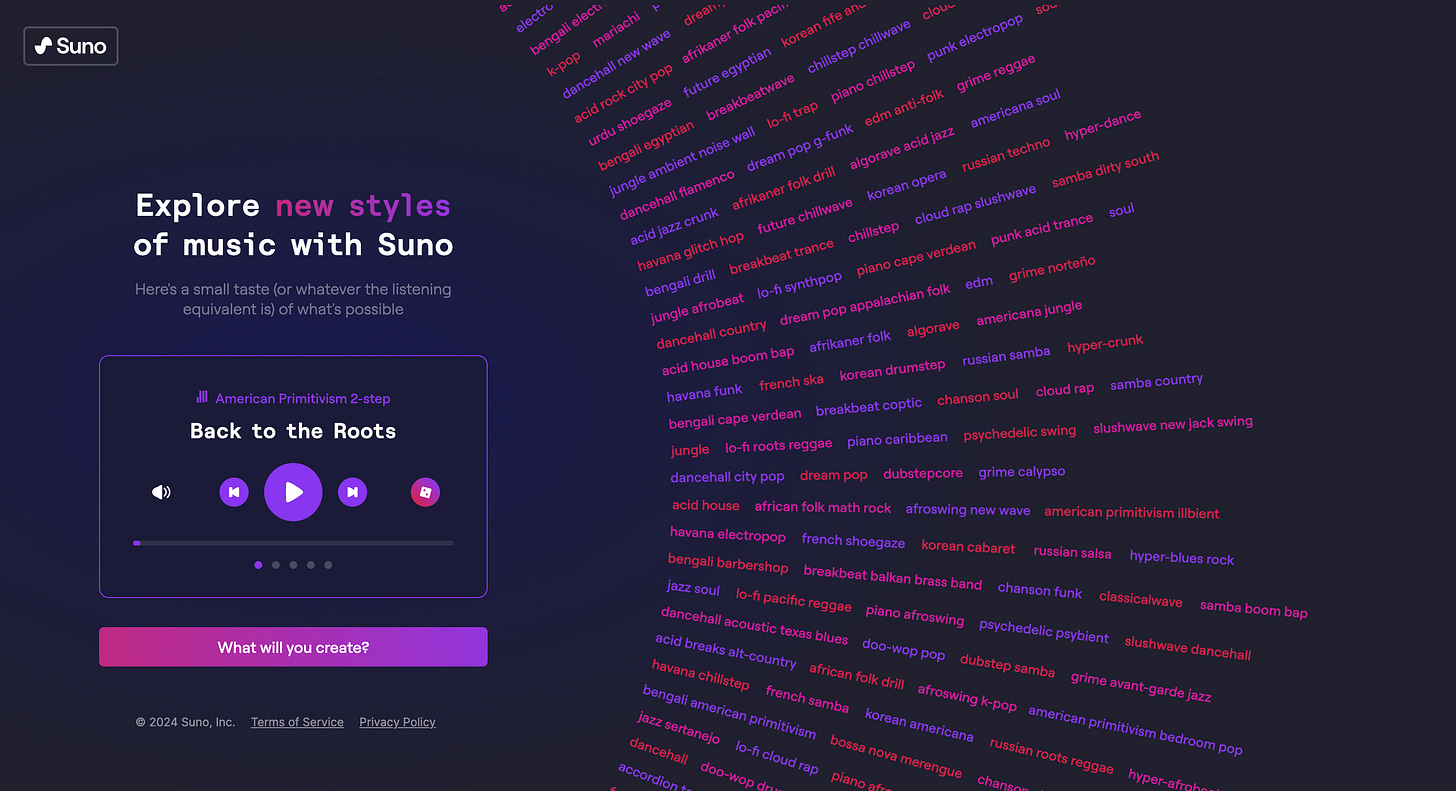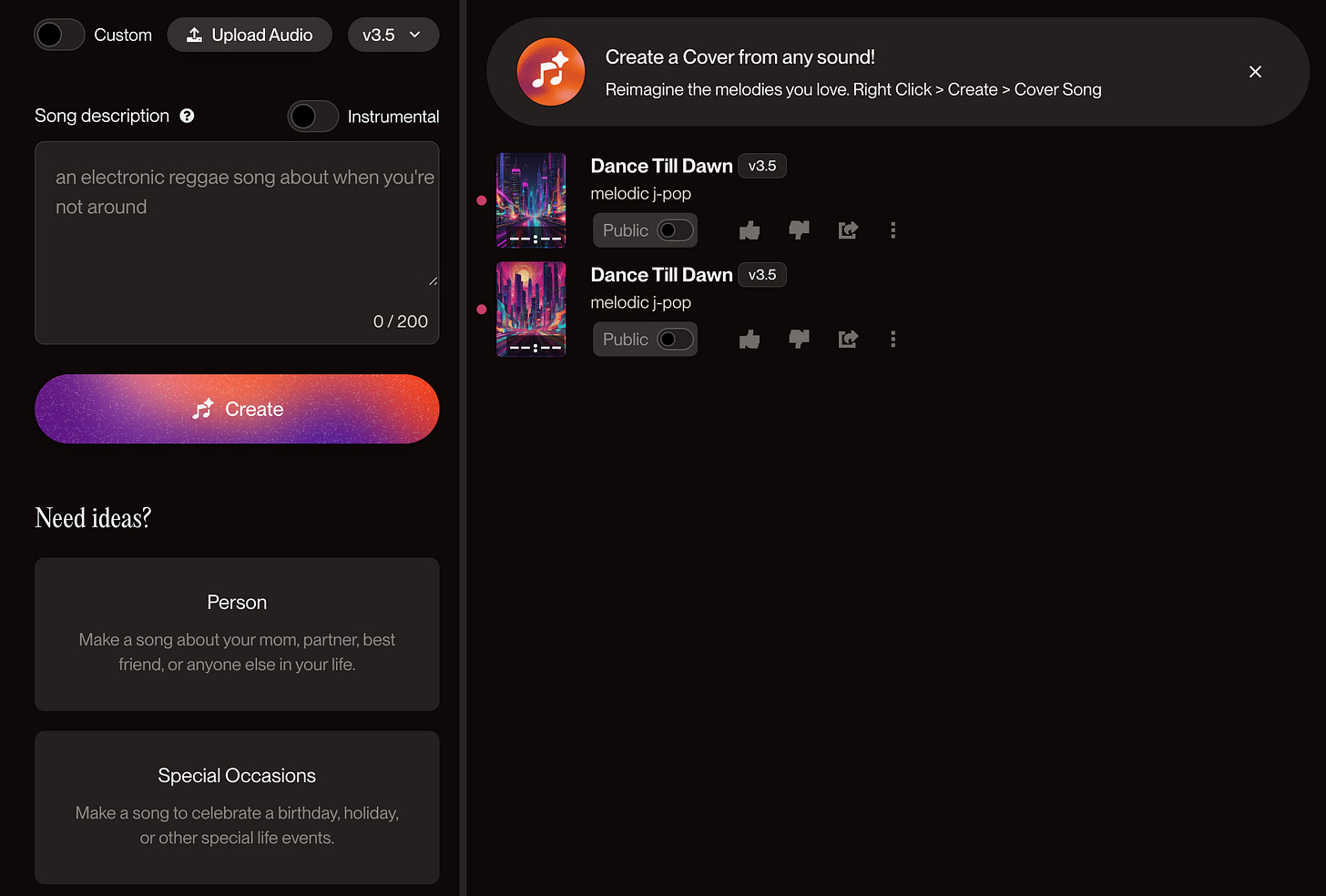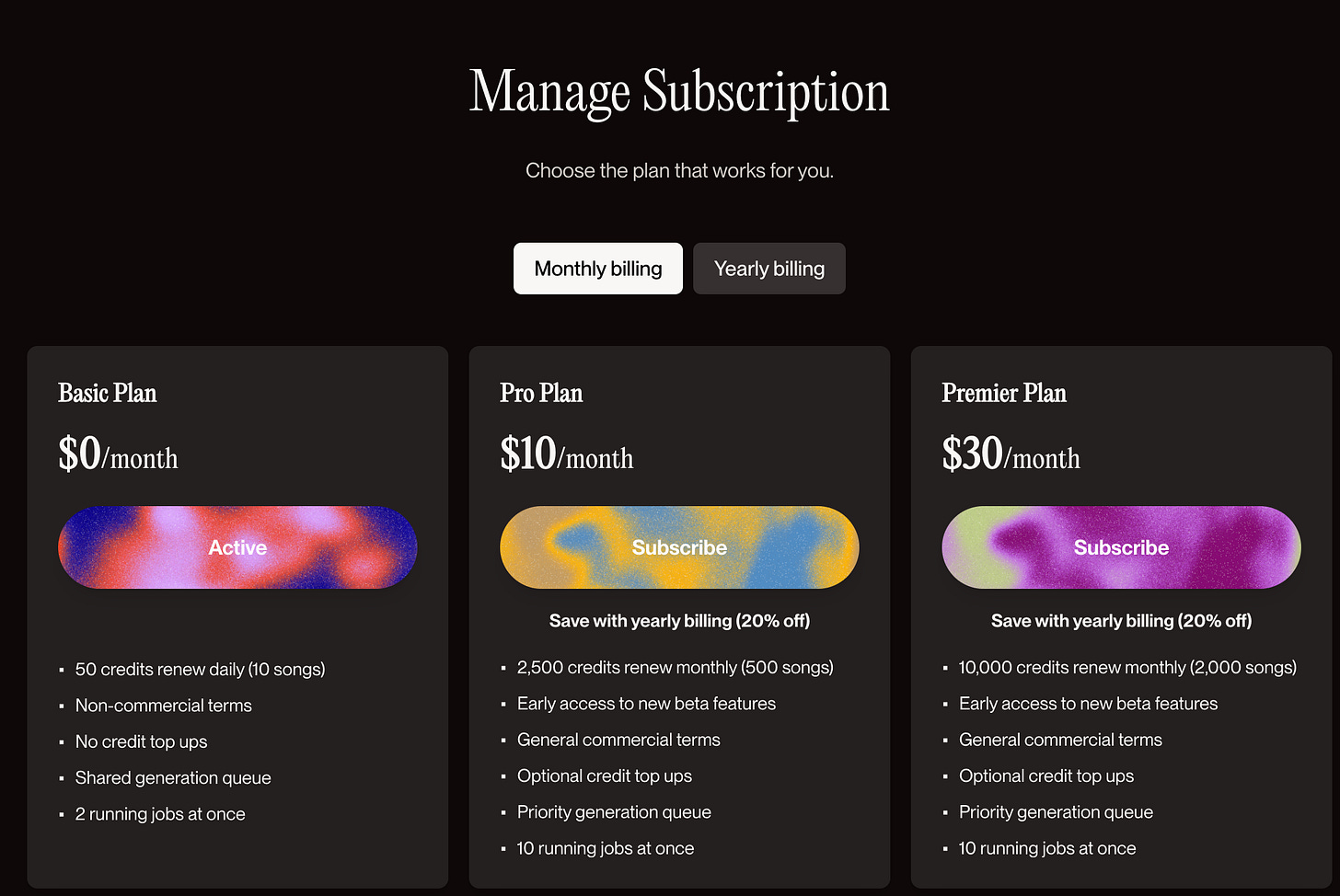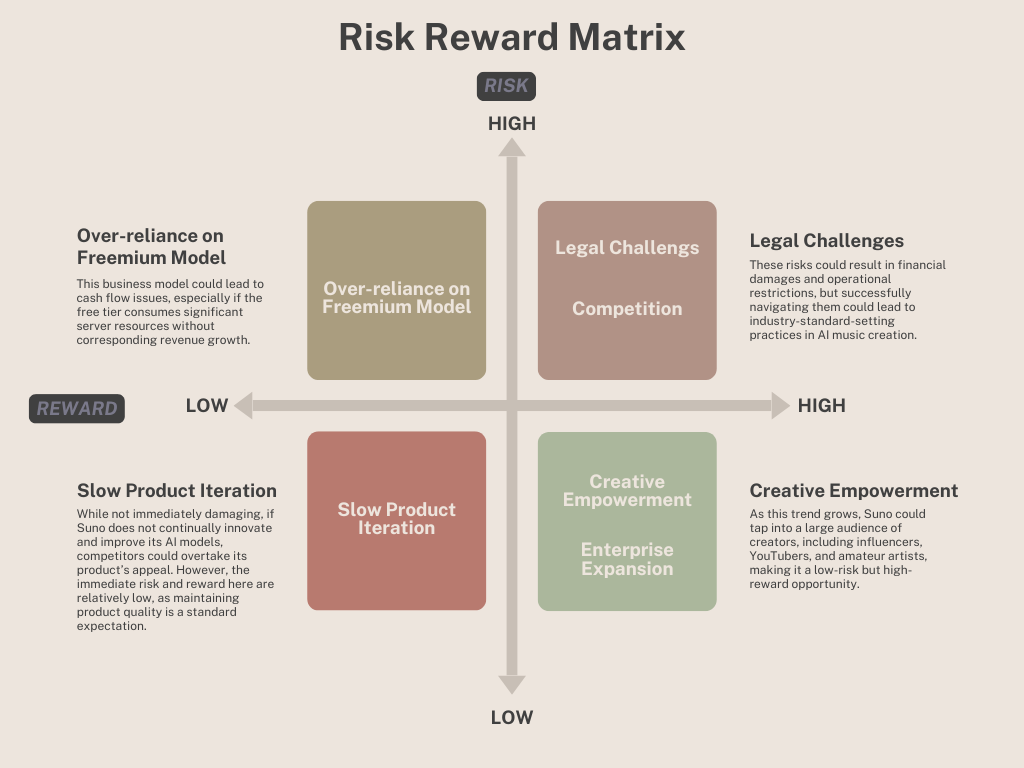Thesis
Suno AI is positioned as a key player in the rapidly growing generative AI music space, offering users a groundbreaking platform to create original music with minimal effort. Launched in 2022, the company seeks to democratize music creation by leveraging transformer and diffusion models to generate high-quality audio content from simple text prompts. Suno’s founders—Michael Shulman, Georg Kucsko, Martin Camacho, and Keenan Freyberg—bring deep expertise from their previous work at Kensho, an AI-driven data analytics firm. Their goal is to tap into the broader market for generative AI by targeting both professional musicians and casual creators.
Suno operates at the nexus of AI and creative industries, where artificial intelligence is increasingly becoming a vital tool for artists, content creators, and entertainment companies. AI-driven platforms are reshaping how music is composed, produced, and distributed. Suno’s innovative approach, which combines ease of use with powerful AI models, allows users to create unique compositions in various genres, without requiring musical expertise.
While the market for generative AI is growing, Suno faces challenges, particularly legal risks related to copyright infringement and data use. Despite this, its robust backing—having raised $125 million in its Series B round—shows strong investor confidence. With the market for AI-generated content expected to grow at a compound annual growth rate (CAGR) of over 34%, Suno has positioned itself as an essential player in this evolving landscape.
Founding Story
The inception of Suno AI can be traced to the collective vision of its four founders, who all previously worked at Kensho, an AI analytics company known for developing innovative data models. Michael Shulman, Georg Kucsko, Martin Camacho, and Keenan Freyberg noticed the growing potential of AI outside of purely data-driven applications and began exploring how it could be applied to more creative fields like music. Their combined expertise in machine learning (ML) and artificial intelligence (AI) formed the basis of Suno's cutting-edge technology.
Suno's founders shared a strong belief in democratizing creativity through technology. The company was launched in 2022 in Cambridge, Massachusetts, with a mission to make music creation accessible to anyone, regardless of skill level. By 2023, Suno had released "Bark," an open-source text-to-speech and audio model. This initial product served as a foundation for Suno’s expansion into AI-generated music, culminating in the launch of its music generator in 2024. The release of Suno’s mobile app further expanded its reach, making music creation accessible on mobile devices.
The company's early success can be attributed to its founders' deep understanding of AI technologies and their commitment to scaling Suno’s platform to reach a broad audience. The rapid development of Suno’s product lineup has positioned it as a frontrunner in the AI music generation market.
Product
Suno AI’s core product is an intuitive, user-friendly AI music generator. It allows users to create original compositions by simply describing the type of music they want—be it genre, mood, or theme. Users can type in a prompt describing their desired song, and Suno’s AI engine generates a full track based on the input. This process leverages a combination of transformer models, which predict the next element in a sequence, and diffusion models, which improve the smoothness of the generated audio.
The product excels in its simplicity, offering even non-musicians the ability to produce professional-quality music. While most AI models focus on text or image generation, Suno’s application of diffusion models to music sets it apart. This approach allows for a more refined and fluid audio output compared to other generative music platforms, such as Boomy or Aimi, which rely more heavily on preset loops and simpler generative models.
Key features include:
Text-to-Music Generation: Users provide a description of the song they want, such as "a chillwave track for a technology podcast intro," and Suno generates the track.
Song Extension: Users can generate short pieces and later extend them into full-length songs, providing flexibility for content creators who need to develop longer musical pieces.
Genre Versatility: Suno supports a wide variety of genres, from electronic to blues, and continually expands its catalog of available styles.
Mobile App: Released in mid-2024, the mobile app allows users to create songs on the go, though it offers fewer features than the desktop version.
One limitation of Suno’s platform is its prohibition on generating music in the style of specific artists, which stems from concerns around intellectual property rights and potential lawsuits from music labels. However, the platform compensates with its ability to create highly customizable and unique compositions based on user input, catering to a wide audience of hobbyists, professional musicians, and content creators.
Grade: A-
Market Outlook
The AI-generated content market, particularly for music, is poised for significant growth. As AI technology continues to advance, tools that enable users to generate music, art, and video content will become increasingly valuable. Suno operates in a fast-expanding space, with the global music industry projected to reach a valuation of $131 billion by 2030. AI-powered music generation will likely capture a growing share of this market, providing new ways for artists, content creators, and brands to produce music quickly and efficiently.
The broader generative AI market is also experiencing rapid growth, with an expected compound annual growth rate (CAGR) of 34.9% between 2023 and 2030. This growth is fueled by increasing demand for AI-driven content creation tools across industries, from gaming and advertising to entertainment. Platforms like Suno, which allow for the creation of customized, royalty-free music, will be essential to meeting this demand. AI-generated music can reduce production costs and time, offering a clear value proposition for businesses and independent creators alike.
Suno is well-positioned within this landscape due to its advanced AI models and ease of use. However, it faces competition from other AI music platforms like Boomy and Soundraw, as well as traditional digital audio workstations (DAWs) such as Ableton Live and FL Studio. These competitors offer varying degrees of customization and professional-grade tools, but Suno's strength lies in its accessibility to non-experts.
One of the primary drivers of growth for Suno will be its ability to secure partnerships with larger platforms and content creators. By integrating its music generation tools into other creative ecosystems—such as gaming, advertising, or social media—Suno could significantly expand its user base. Additionally, its potential for enterprise applications, such as providing music for brands or media companies, opens up further avenues for growth.
Grade: B+
Business Model
Suno operates a freemium subscription model, where users can access a limited number of song generations for free, but must pay for expanded access and additional features. The subscription tiers unlock more song creation, advanced editing tools, and commercial licenses for users looking to monetize their music.
The company also generates revenue through API integrations, which allow developers and businesses to incorporate Suno’s music generation capabilities into their own platforms. This enterprise-facing model opens up significant opportunities in industries such as gaming, advertising, and digital content creation, where custom music is often required on-demand.
Suno’s ability to monetize through both individual subscriptions and enterprise partnerships provides a strong foundation for growth. As the market for AI-generated content expands, Suno is well-positioned to capitalize on the increasing demand for flexible, easy-to-use music creation tools. The company has also signaled plans to explore licensing deals with larger platforms, which could help it scale even faster.
However, Suno must continue refining its monetization strategy, particularly in the face of potential legal challenges related to intellectual property rights. As the company grows, it will need to navigate licensing agreements or secure "fair use" exemptions to ensure its training models are legally compliant.
Grade: A-
Valuation
Suno raised $125 million in its Series B round in 2024, which valued the company at $500 million. This valuation reflects strong investor confidence in the company’s AI technology and growth potential. The influx of capital will allow Suno to continue refining its product, scaling its platform, and exploring new business opportunities.
The company's valuation aligns with broader trends in AI, where investors are pouring significant capital into generative AI startups. Suno’s ability to secure high-profile investors, such as Lightspeed Venture Partners, further validates its potential. However, the valuation also comes with high expectations. The company must continue growing its user base, improving its product, and addressing legal challenges to meet investor demands. Suno's ability to navigate these complexities while continuing its trajectory of growth will be crucial in fulfilling the expectations tied to its current valuation.
Grade: B
Floors & Windows
Floors (Risks)
Legal Risks: The most significant risk facing Suno is potential litigation over copyright infringement. As an AI-driven platform that trains on large datasets, there is a high risk of being sued by music labels for using copyrighted materials without proper licensing. In 2024, the Recording Industry Association of America (RIAA) filed a lawsuit against Suno, raising concerns about the legality of its training methods.
Competitive Pressure: The generative AI music space is becoming increasingly crowded. Competitors like Boomy, Soundraw, and traditional digital audio workstations are constantly improving their offerings. Suno must continue to innovate and differentiate itself to stay ahead.
Monetization Challenges: While Suno’s freemium model has successfully attracted a large user base, the company must maintain high conversion rates from free users to paid subscribers. If users do not see enough value in the paid features, the company’s revenue growth could stagnate.
Windows (Opportunities)
Creative Empowerment: Suno's mission to democratize music creation provides a vast opportunity in the growing creative empowerment space. As more people turn to AI for creative expression, Suno can capture a significant share of this emerging market.
Enterprise Partnerships: Suno’s API integrations present substantial potential for enterprise growth. By partnering with gaming companies, advertising agencies, and content creators, Suno can expand its reach and diversify its revenue streams.
International Expansion: With its mobile app launched in 2024, Suno has the opportunity to expand into new markets, particularly in regions where mobile-first content creation is on the rise. Targeting international creators could drive significant user growth.
Grade: B+
Summary
Suno AI has emerged as a leader in the AI-generated music space, leveraging cutting-edge models and an accessible platform to democratize music creation. With a strong product offering, robust market potential, and a growing user base, Suno is well-positioned for continued growth. However, the company faces significant challenges, particularly around copyright law, that could impede its success if not carefully managed.
Suno's product innovation and focus on accessibility provide it with a clear competitive edge, but sustaining growth will require navigating legal complexities and differentiating itself in a rapidly evolving market. Its current valuation reflects strong investor confidence, but Suno must meet high expectations to justify its $500 million valuation.
Final Grade: B+
Thank you all for reading for more investment memos please subscribe below but if you want to see more of what we’re made then check out our previous post here






